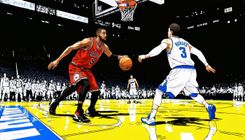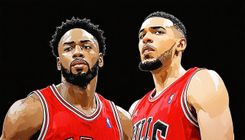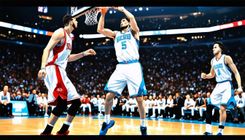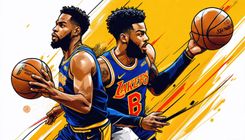Identifying Clutch Players in the NBA: Who Takes the Final Shot?
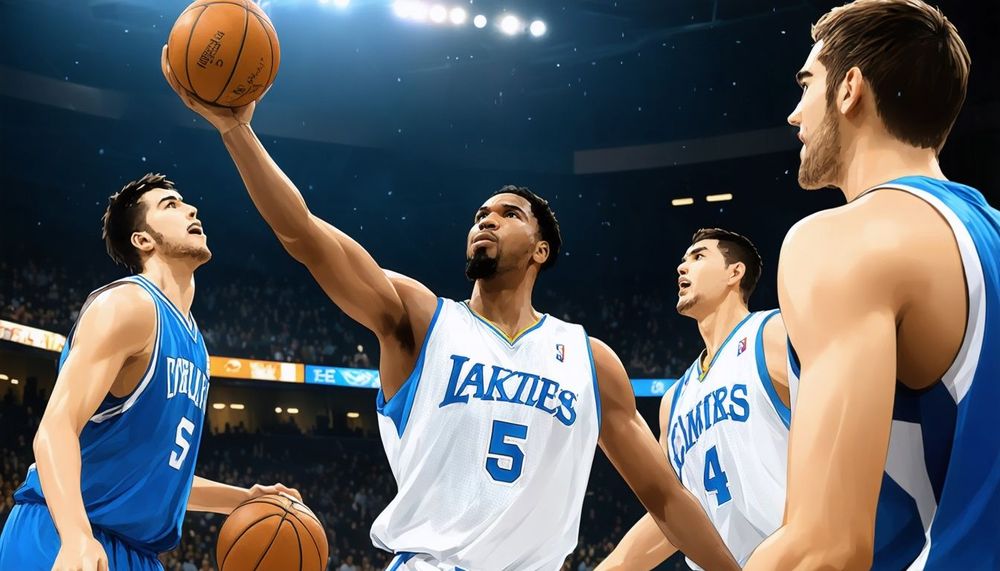
In modern NBA basketball, analytics have become a pivotal component, enriching the research and comprehension of the game. Yet, as the shot clock ticks down, it remains essential for every team to have a player they can rely on to score in crucial moments. Identifying these key players can be challenging, particularly with numerous player movements during the 2025 offseason. The Los Angeles Lakers face a crucial question: Has Luka Dončić solidified his role as the go-to scorer, or does LeBron James' extensive experience still make him the primary option? Amid Kyrie Irving's recovery from a torn ACL, the Lakers must also consider if Anthony Davis or rookie Cooper Flagg will take the final shot when it matters most. Meanwhile, the Washington Wizards are still in search of a player who can step up under pressure. As the game nears its conclusion, the identity of each team's clutch shooter is a compelling discussion.
The Atlanta Hawks are among the most enhanced teams in the 2025 offseason, having added players such as Kristaps Porziņģis and Nickeil Alexander-Walker. Jalen Johnson is expected to return strong from a shoulder surgery, and the 2024 No. 1 overall pick, Zaccharie Risacher, finished his rookie season on a high note. Nonetheless, when it comes to crunch time, the ball is likely still best placed in Trae Young's hands. He averaged 7.1 points per game during the fourth quarter of the previous season, outclassing notable players like Shai Gilgeous-Alexander, Stephen Curry, Kevin Durant, and Nikola Jokić in scoring. While Young's shooting percentages were less than stellar, the effectiveness he displays in late-game situations makes him the leading candidate for the Hawks unless Jalen Johnson can elevate his game further.
With Jayson Tatum anticipated to miss the entirety of the 2025-26 season due to a torn Achilles, the Boston Celtics find themselves with significantly fewer options for final-shot scenarios. However, they still retain their top scorer from last season, as Jaylen Brown outperformed Tatum in fourth-quarter scoring. Brown averaged 5.4 points per game in the final quarter, compared to Tatum's 5.1 points, and will now assume a more prominent offensive role. Derrick White also demonstrated capability by averaging 4.9 points in the fourth quarter, while Payton Pritchard is available for long-range attempts as needed.
In Brooklyn, the status of Cam Thomas remains uncertain, as he is currently a restricted free agent but expected to remain with the Nets. The team’s scoring options seem limited aside from Thomas and Michael Porter Jr. While Porter is not shy about attempting shots, Thomas has the advantage of skillfully creating his own opportunities. Last season, Thomas outshined other notable players like Shai Gilgeous-Alexander, Anthony Edwards, Giannis Antetokounmpo, and Nikola Jokić in fourth-quarter points per game and led the league in fourth-quarter usage rate.
LaMelo Ball claimed the title for the highest fourth-quarter scoring average in the NBA last season, solidifying him as the Charlotte Hornets' key player for late-game scenarios. His willingness to take shots in high-pressure situations, regardless of being guarded, distinguishes him as a reliable option. As the Hornets aim to maintain playoff contention, Ball's health will be crucial, particularly considering the current dynamic of the Eastern Conference.
The Chicago Bulls are presented with some options for crucial moments during the game, with Coby White capable of delivering in clutch situations, as proven during his time on the court. Giddey's pass-first mentality may lead to a different style of play in these moments. White's extraordinary free-throw shooting adds to his reliability, making him one of the better choices for late-game responsibilities.
The Cleveland Cavaliers possess multiple players suitable for clutch scenarios, particularly if Evan Mobley continues to develop his offensive skills. Darius Garland has shown he can perform under pressure, but Donovan Mitchell holds primary responsibility as the leading scorer in fourth-quarter performances. Mitchell's diverse skills allow him to score in various ways, making him a versatile choice in crunch time.
Kyrie Irving’s absence due to a torn ACL creates a pivotal opportunity for either Anthony Davis, Cooper Flagg, or Klay Thompson to emerge as the last-shot player for the Dallas Mavericks. Despite his capabilities, Davis struggled in the fourth quarter last season following his trade to Dallas. While Davis remains a prominent option, Flagg may be more suited for clutch situations due to his growing offensive repertoire.
The Denver Nuggets continue to demonstrate a strong co-dependency between Nikola Jokić and Jamal Murray, both key players in the team's late-game offensive strategy. Jokić showcased remarkable efficiency during the fourth quarter, proving that trust in his abilities during high-pressure situations remains well placed.
Cade Cunningham displayed significant responsibility last season, especially with Jaden Ivey sidelined with injury. Cunningham led the Pistons in fourth-quarter contributions, and with Ivey returning and additional playmakers joining the squad, he is still expected to carry a substantial part of the offensive load, particularly in clutch moments.
Despite being new to the Golden State Warriors, Jimmy Butler will not overshadow Stephen Curry as the primary option during late-game situations. Curry has a long-standing reputation for executing in crucial moments, making him a staple for the Warriors when they need a final shot. Even though his shooting percentages dipped last season, Curry’s clutch history cannot be easily dismissed.
The Houston Rockets are in search of a definitive go-to scorer in crunch time, especially following their first-round playoff exit from the previous season. Kevin Durant’s acquisition brings a seasoned scorer to the franchise, complementing Devin Booker and other offensive talents. While several players can contribute during the game, Durant is likely to be pivotal in the fourth quarter moving forward.
The Indiana Pacers will begin the season without Tyrese Halliburton due to injury, creating a need for other players to assume scoring responsibilities late in games. Bennedict Mathurin performed well in Halliburton’s absence last season, and the expectation is that this trend will continue as he steps into a more prominent role.
Kawhi Leonard's role looks set to expand with Norman Powell's departure from the Los Angeles Clippers. Leonard now finds himself in a position to take control of the team's late-game scenarios, capitalizing on his ability to score in seemingly impossible situations.
The Los Angeles Lakers' dynamics are shifting as LeBron James integrates both himself and Luka Dončić into late-game decisions. James has increased his fourth-quarter scoring averages recently and remains confident in his late-game ability. However, Dončić’s promising talent offers an intriguing narrative for Lakers fans to consider.
The Memphis Grizzlies heavily rely on Ja Morant's return to elevate the team's fourth-quarter effectiveness. When healthy, Morant’s capabilities at finishing around the rim allow him to thrive in high-pressure scenarios, and his performance history indicates he can make a significant impact.
The Miami Heat, now adjusting to a new configuration following the departure of Jimmy Butler, will see a blend of players sharing the late-game scoring burden. Tyler Herro, Andrew Wiggins, and Bam Adebayo will likely be called upon to contribute in these moments, while recent acquisitions aim to strengthen the offensive attack.
The Milwaukee Bucks will navigate changes following the departure of Damian Lillard. While Lillard's late-game efficiency was under scrutiny, Giannis Antetokounmpo may gain more opportunities to score in crunch time after averaging several key stats in the fourth quarter last season.
Anthony Edwards, a rising star for the Minnesota Timberwolves, has established himself as the go-to player in late-game situations, showcasing his ability to deliver under pressure. His remarkable skill set places him in position to lead his team's offensive efforts during critical game moments.
Zion Williamson has proven that he is a challenging matchup late in games. His scoring ability ranks him among the league's elite fourth-quarter performers, and as the New Orleans Pelicans seek to rely on him in crucial moments, the focus on his health and availability will be paramount.
Jalen Brunson’s performance in clutch situations was noteworthy last season, marking him as a reliable scorer in the final moments of closely contested games. Brunson's capability to create space and take crucial shots solidifies his position as one of the most dependable players during critical instances.
Shai Gilgeous-Alexander's ability to drive to the basket and create scoring opportunities comes into focus; his fourth quarter scoring reflects the Oklahoma City Thunder's often strong performances, often built upon comfortable leads. While not the leading scorer at the end of games, his efficiency is a pivotal asset.
The Orlando Magic's fourth-quarter dynamics heavily rely on the offensive capabilities of Paolo Banchero and Franz Wagner's performances. Banchero's scoring is advantageous, yet the shared responsibilities in crunch moments hint at an interesting offensive strategy.
Tyrese Maxey has emerged as the leading scorer for the Philadelphia 76ers, historically taking on responsibilities during close games. His capacity to deliver clutch performances will be vital for the team's aspirations this season.
Devin Booker faces a significant increase in offensive responsibility for the Phoenix Suns following roster changes. As the primary option, the burden of late-game scoring will fall on his shoulders, requiring him to navigate defensive pressure from opponents who will work to contain him.
The Portland Trail Blazers are in a transition period, making it difficult to select a definitive last-shot option. With recent trades and injuries in play, young talents like Deni Avdija may need to step up to lead the team in late-game situations.
The Sacramento Kings are navigating similar dynamics as their players, Zach LaVine and DeMar DeRozan, are both poised to contribute late in games. Their contrasting playing styles give the Kings multiple scoring options, a particularly valuable asset in tight matchups.
The San Antonio Spurs boast several options for scoring in the final minutes of games, especially with Victor Wembanyama's arrival. His talents combined with other young prospects may create a formidable scoring unit moving forward into endgame situations.
The new-look Toronto Raptors have yet to demonstrate cohesion, affecting their late-game strategy. As players like RJ Barrett and Scottie Barnes work towards developing on-court chemistry, the offensive hierarchy will unfold over the course of the season.
Despite Lauri Markkanen leading the Utah Jazz in overall scoring last season, his late-game scoring struggles emerged as a concern. With several offensive contributors moving on, Markkanen's ability to deliver when required may be pivotal as the team looks for key production.
In Washington, the Wizards face uncertainty regarding ideal candidates for final shots. CJ McCollum stands as a viable option given his scoring history, but a blend of emerging players may shift scoring responsibilities as the franchise focuses on development in the upcoming season.



